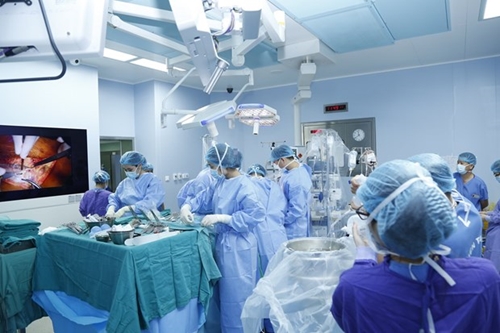Throughout 2020, Vietnamese doctors conducted a series of special transplants, including two bowel transplants from live donors, considered one of the most difficult organ transplantation techniques.
A record number of 23 organs – three hearts, four livers, and 16 kidneys - were transplanted within 13 days at the Vietnam-Germany Friendship Hospital, while five liver transplants were operated in one week by doctors of the Central Military Hospital 108.
    |
 |
|
Medical personnel of Central Military Hospital 108 conducting a liver transplant |
The patient receiving the limb was Pham Van Vuong, 31, from Thanh Tri district in Hanoi. The 8-hour surgery was conducted on January 21 this year by professor Nguyen The Hoang, deputy director of the hospital, and his colleagues.
According to Dr. Mai Hong Bang, Director of the Military Central Hospital 108, since 1998, about 89 limb transplants – a highly sophisticated microvascular surgery technique – have been performed worldwide. All were from brain dead donors, however.
The first kidney transplant in Vietnam was conducted on June 4, 1992 at the Military Hospital 103 in Hanoi. The recipient was Vu Manh Doan, 40, and the donor was his 28-year-old younger brother. It was a notable milestone in the history of the country’s health sector.
So far, the Vietnam-Germany Friendship Hospital has performed 1,000 kidney transplants.
Also in 2020, the Ho Chi Minh City Children’s Hospital successfully separated 16-month-old conjoined twins – Truc Nhi and Dieu Nhi, with the sisters now able to walk on their own. The surgery was performed by 93 doctors and nurses.
The twins were born on July 6, 2019, in the city’s Hung Vuong Hospital, joined in the pelvis and abdomen, and had only one anal hole between them. They had two bladders located on either side of their common abdomen, an open pubic joint and pelvises arranged in a circle.
Their health conditions will be supervised by the hospital until they reach 18.
So far, Vietnam has had 19 organ transplant centres. The success of the country in the field has opened up new opportunities for patients suffering fatal diseases.
Source: VNA